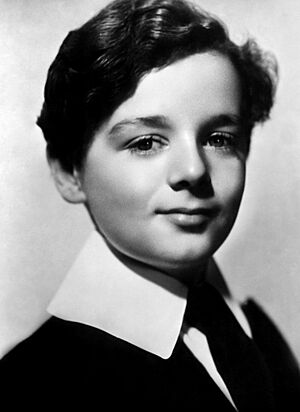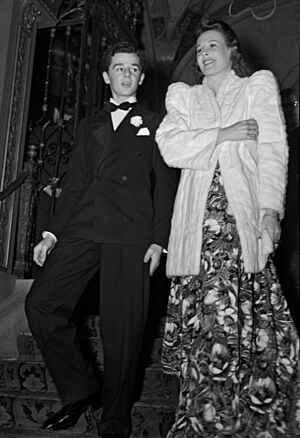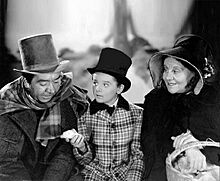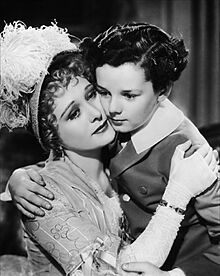Freddie Bartholomew facts for kids
Quick facts for kids
Freddie Bartholomew
|
|
|---|---|

Bartholomew in Little Lord Fauntleroy (1936)
|
|
| Born |
Frederick Cecil Bartholomew
March 28, 1924 |
| Died | January 23, 1992 (aged 67) Sarasota, Florida, U.S.
|
| Education | Italia Conti Academy of Theatre Arts |
| Occupation | Actor |
| Years active | 1930–1951 |
| Spouse(s) |
|
| Children | 2 |
Frederick Cecil Bartholomew (born March 28, 1924 – died January 23, 1992), known as Freddie Bartholomew, was a famous English-American child actor. He was one of the most popular child stars in Hollywood films during the 1930s. His most well-known roles were in Captains Courageous (1937) and Little Lord Fauntleroy (1936).
Freddie was born in London in 1924. When he was 10, he moved to the United States for his role in MGM's movie David Copperfield (1935). He lived in the U.S. for the rest of his life and became an American citizen in 1943.
Even though he was very successful, his time as a child star was difficult. He faced many family disagreements about his earnings, which affected his money and his career. After serving in World War II, his film career slowed down. He then started working behind the scenes in television, becoming a director and producer.
Contents
Biography
Early life and acting talent
Freddie Bartholomew was born in March 1924, in Harlesden, London. His parents were Cecil Llewellyn Bartholomew and Lilian May Clarke Bartholomew. By age three, Freddie lived in Warminster, England, with his grandparents. His "Aunt Cissie" (Millicent Mary Bartholomew) raised him and became like a mother to him. Freddie went to Lord Weymouth's Grammar School and was also taught by his Aunt Cissie.
From a very young age, Freddie loved to perform. By age five, he was known in Warminster as a "boy wonder." He would recite poems, stories, and parts of plays, including Shakespeare. He also sang and danced. His first movie role came when he was just six years old in 1930.
Becoming a child star
From England to Hollywood
Freddie studied acting at the Italia Conti Academy of Theatre Arts in London. He appeared in four small British films. In 1934, American filmmakers George Cukor and David O. Selznick saw him in London. They chose him for the main role in their MGM film, David Copperfield. Freddie and his aunt moved to the United States in August 1934. MGM then gave him a seven-year movie contract.
David Copperfield was a huge success and made Freddie a star overnight. He then acted in many films with popular actors of that time. Some of his successful movies in the 1930s included Anna Karenina with Greta Garbo, Little Lord Fauntleroy, and Captains Courageous with Spencer Tracy.
Freddie really enjoyed making Captains Courageous. The movie took a whole year to film, often off the coasts of Florida and Catalina Island. He remembered, "For a kid, it was like one long outing. Spencer Tracy, Lionel Barrymore, Mickey Rooney, Melvyn Douglas and I; we all grew very close."
His acting talent, friendly personality, and clear English accent made him a favorite with audiences. He quickly became the second-highest-paid child movie star, right after Shirley Temple. Many people praised his acting. A writer for The New York Times said Freddie played his role in Captains Courageous "faultlessly."
Challenges with his career
By April 1936, after the popular Little Lord Fauntleroy, Freddie's fame led to family disagreements. These problems lasted for nearly seven years. Sadly, most of the money Freddie earned was spent on lawyers and court fees because of these family issues.
Because of these financial problems, Freddie's aunt asked MGM for more money for him in July 1937. She even threatened to end his contract. This disagreement kept him from working for a year. He missed out on big roles, like the lead in a film called Kim.
Freddie started acting again in 1942, but in fewer important films. After 1938, he was not as popular as before. This was partly because of his disagreements with MGM. Also, by 1938, he was a tall teenager, and the world was focusing on World War II. Movies based on classic books, which Freddie was good at, were less popular.

In 1938, Twentieth Century Fox hired Freddie for the lead in Kidnapped. MGM paired him with Mickey Rooney in Lord Jeff and A Yank at Eton. He also starred with Judy Garland in the musical Listen, Darling. In 1939, Universal had him work with Jackie Cooper in The Spirit of Culver. He also appeared in Swiss Family Robinson in 1940. As World War II continued, Columbia cast him in three military-themed films.
World War II and later career
Military service and career change
Freddie's acting career was further interrupted by World War II. He joined the U.S. Army Air Forces in January 1943, at age 18. He worked on aircraft maintenance. During his training, he hurt his back and was in the hospital for seven months. He was discharged in January 1944.
He had one film role in 1944, in a comedy called The Town Went Wild. This was his second-to-last movie role. His attempts to restart his film career were not successful. Performing in local theaters and vaudeville shows also did not help him make a comeback.
In 1946, Freddie married Maely Daniele. This marriage caused a serious disagreement with his aunt, who then moved back to England. Freddie also appeared in a radio play in 1946. In 1947, he had a small role in the musical film Sepia Cinderella. He spent most of 1948 touring small American theaters. In November 1948, he went to Australia for a singing and piano act.
Switch to television
When he returned to the United States in 1949, Freddie decided to work in the new world of television. He changed from being an actor to a television host, director, producer, and executive. He preferred to be known as Fred C. Bartholomew. From 1949 to 1954, he was a television director for WPIX in New York City. His last acting role was as a priest in the 1951 film St. Benny the Dip.
He divorced his first wife in 1953. In December of that year, he married Aileen Paul, a television chef. They had a daughter, Kathleen, born in 1956, and a son, Frederick, born in 1958. The family lived in Leonia, New Jersey.
In 1954, Freddie started working for an advertising agency called Benton & Bowles. He became a television producer and director there. He produced shows like The Andy Griffith Show and directed several television soap operas, including As the World Turns. In 1964, he became a vice president at the company.
Freddie and his second wife divorced by early 1977. He married his third wife, Elizabeth Grabill, in February 1976. They remained married for the rest of his life.
Later years and passing
Freddie retired from television in the late 1980s due to a lung condition called emphysema. He moved with his family to Bradenton, Florida. In 1991, he was interviewed for a documentary film called MGM: When the Lion Roars. Freddie died from heart failure in Sarasota, Florida, in January 1992, at age 67.
Honors
- On April 4, 1936, Freddie Bartholomew placed his handprints, footprints, and signature in front of Grauman's Chinese Theatre.
- In 1960, he received a motion pictures star on the Hollywood Walk of Fame at 6663 Hollywood Boulevard. This was for his important work in the film industry.
- He is one of the 250 Greatest Male Screen Legends chosen by the American Film Institute in 1999.
Filmography
- Toyland (1930, Short)
- Fascination (1931) – Child
- Lily Christine (1932) – Child (uncredited)
- Strip! Strip! Hooray!!! (1932, Short) – Boy (uncredited)
- David Copperfield (1935) – David Copperfield as a boy
- Anna Karenina (1935) – Sergei
- Professional Soldier (1935) – King Peter II
- Little Lord Fauntleroy (1936) – Cedric "Ceddie" Errol, Lord Fauntleroy
- The Devil is a Sissy (1936) – Claude
- Lloyd's of London (1936) – Jonathan Blake as a boy
- Captains Courageous (1937) – Harvey Cheyne
- Kidnapped (1938) – David Balfour
- Lord Jeff (1938) – Geoffrey Braemer
- Listen, Darling (1938) – 'Buzz' Mitchell
- The Spirit of Culver (1939) – Bob Randolph
- Two Bright Boys (1939) – David Harrington
- Swiss Family Robinson (1940) – Jack Robinson
- Tom Brown's School Days (1940) – Ned East
- Naval Academy (1941) – Steve Kendall
- Cadets on Parade (1942) – Austin Shannon
- A Yank at Eton (1942) – Peter Carlton
- Junior Army (1942) – Freddie Hewlett
- The Town Went Wild (1944) – David Conway
- Sepia Cinderella (1947) – Himself
- St. Benny the Dip (1951) – Reverend Wilbur
 | Chris Smalls |
 | Fred Hampton |
 | Ralph Abernathy |




